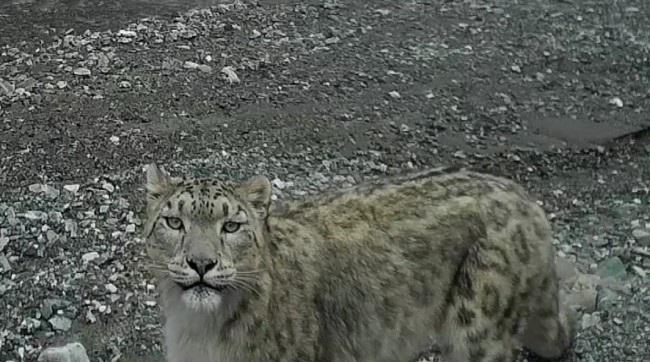AI-aided tech developed for snow leopard protection
LANZHOU-Artificial intelligence has been applied extensively in a national park in northwestern China to track snow leopards.
The AI-aided digital toolbox can automatically distinguish the species in Gansu province's Qilian Mountains National Park from other wildlife, using images captured by infrared cameras. The technology, developed by Chinese internet giant Tencent, the World Wild Fund and One Planet Foundation, improves the efficiency of data processing.

A snow leopard in Qilian Mountains National Park [Photo provided to chinadaily.com]
Located around 3,500 meters above sea level, the Qilian Mountains, with vast stretches of bare rocks protruding from the grass, provide a favorable habitat for snow leopards. Though more than 200 cameras have been installed in the region, sorting out relevant information has not been easy for researchers.
"To conduct further studies on the population, distribution and activities of the snow leopards-a flagship species in the region-the cameras capture hundreds of thousands of video clips and photos every quarter," said Ma Duifang, who works for the administration bureau of the park's Gansu section.
"Even a slight movement in the environment, such as a mild breeze blowing over the grass, can activate the cameras. Sometimes, curious wildlife bump into the device, triggering the shutter, and the cameras take pictures of mere clouds," Ma added.
Ma and his colleagues had to go through each video frame by frame, and information about the species that appeared in the images also required human input, so it often took them several weeks to complete such tasks.
Tencent's engineering team independently developed a species-recognition algorithm by means of transfer learning and automatic data augmentation. Thanks to AI technologies, researchers in the Qilian Mountains National Park no longer need to rack their brains in search of leopards hiding in the wild.
"The forest rangers can now locate a snow leopard from 1,000 pictures in only about 20 minutes, much faster than before," said Huang Xiangqi, one of the technology's developers.
Snow leopards are under China's highest national-level protection and are listed as vulnerable by the International Union for Conservation of Nature.
In China, they can be spotted in alpine areas in southwestern, northwestern and northern regions including Sichuan and Gansu provinces, and the Tibet, Xinjiang Uygur and Inner Mongolia autonomous regions.
"We hope we can combine monitoring data with field investigations to help researchers identify the wild species so as to draw up a more specific plan for their protection," said Ma Yao, director of the project.
Copyright © Lanzhou City, Gansu Province.
All rights reserved. Presented by China Daily.
Copyright © Lanzhou City, Gansu Province. All rights reserved. Presented by China Daily.




